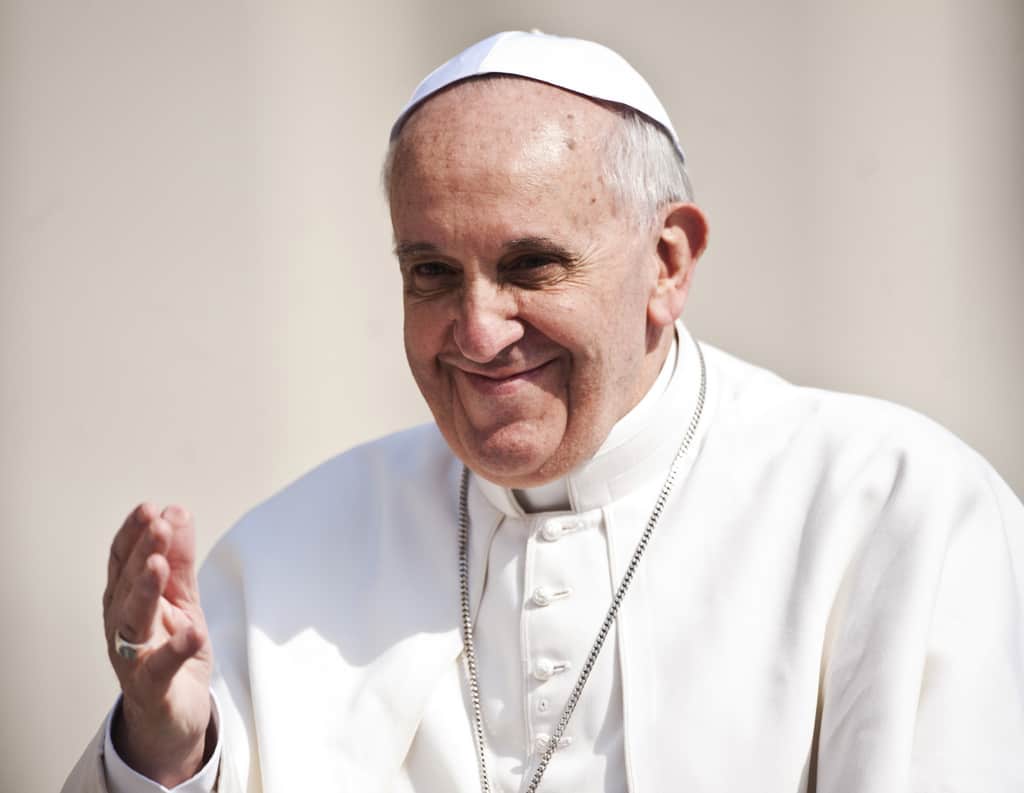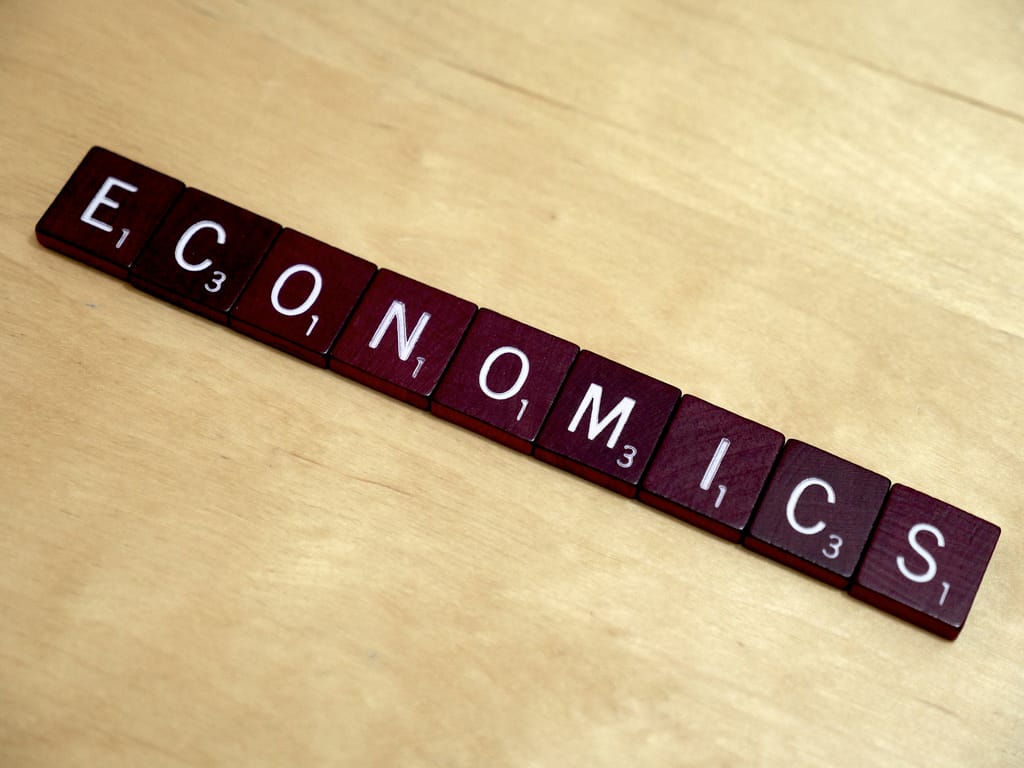Here is the question: Is Pope Francis, leader of the Catholic Church, kisser of babies, winner of the internet, writer of enormously long “Apostolic Exhortations”, a Marxist? Long question though it be, the answer is a short one: No. But all that short answer really means is that the question wasn’t very good. So, here’s another, better, one: What kind of economics does Pope Francis stand for? I’ll need more than one word to answer this one.
All this talk of papal economics and accusations of Marxism started a couple of months ago, when Francis issued the apostolic exhortation, Evangelii Gaudium, (henceforth EG). It was in this exhortation that, albeit in passing, he explicitly denounced “trickle down economics” and the “economy of exclusion” (EG 54), while calling for “the return of economics and finance to an ethical approach which favours human beings” (EG 58). It remains a strong critique, but it does not make Pope Francis a Marxist.
In fact the Pope can much more accurately be called a communalist (and, yes, I’m being careful to include the “al” in there). By calling Francis a communalist what I mean to say is that his economic policy priorities continually put the community at the forefront of our collective mind.
Taking a cue from some of the more balanced commentators on Francis’ words on economics (like TWP’s Michael Gerson and The Atlantic’s Heather Horn), I’d like to dig a little deeper into what it means to call Francis’ economic message communalistic.
The Church As Community in Evangelii Gaudium
Economic communalism – and the focus Francis gives to community – is not particularly unique to him; it’s an idea deeply anchored in the history of the Church’s Social Teaching. After all the Church primarily defines itself as a community, a place of belonging and living.1 In EG, for example, Francis talks about the Church as a “missionary gathering”:
The Church which “goes forth” is a community of missionary disciples who take the first step, who are involved and supportive, who bear fruit and rejoice. An evangelizing community knows that the Lord has taken the initiative, he has loved us first (c.f. 1 Jn 4:19), and therefore we can move forward, boldly take the initiative, go out to others, seek those who have fallen away, stand at the crossroads and welcome the outcast. (EG 20)
We see here the communal dimension which runs through all of Francis’ thought – economic and otherwise. For Francis, to be a church means that we are both called to be together in unity and called to go out and actively proclaim the kingdom.
In fact, that’s the reason why the Pope discusses the economy at all: Our participation in the economy (e.g., as workers, as consumers, as voters) is one of our most common ways of interacting with one another as human beings. In other words, the economy is a way of being community. And for we who are believers, our community of faith ought to have an impact on the way we treat one another as economic agents.2
Communalist Economics
It is because he views the economy as community that Francis’ believes that all exclusion, economic or otherwise, must be challenged. The church community’s job, he thinks, is to do what Jesus did: bring people together in right relation. Hence he says, for example, if money rules rather than serves (EG 58) that it takes precedence over our call to come together and thereby fosters divisions. Hence he denounces any perspective that, subtly or not, views money as king.3
All well and good, but on a practical level what is Francis is looking for? Well, it might be something like what Fr. Greg Boyle, SJ is doing.4 As you might know, Boyle is the head of “Homeboy Industries,” a job-finding and job providing non-profit in East LA. Boyle’s mission is to keep the young men and women of East LA from joining gangs and perpetuating urban warfare by providing them jobs. Homeboy provides jobs directly – through a silk-screening and embroidering workshop, a graffiti removal service, a bakery, a tattoo-removal business, etc. – and by matching young men and women with prospective employers.
Fr. Boyle has been interviewed about his work many times, by many people, including Anderson Cooper. In Cooper’s second interview with Fr. Boyle he reminisces about their first, especially about a moment when he had asked “Aren’t you afraid that you will be taken advantage of?” What Cooper remembers most, however, is Fr. Boyle’s response: “Here, we give our advantage away.” You can see that exchange at 1:25 of this clip:
As someone who grew up studying the theory of competitive advantages and the means of profitable product differentiation, this was a message that it was hard for me to hear. How can you run a business by giving your advantage away? I’ve given this much thought and study over the years, and it seems to me that what Fr. Boyle is describing is really the underlying nature of all relationships, economic and otherwise.
I look at it this way: You can only trade what’s valuable. So in any transaction, you have two people giving away something that they – and society – views as valuable. And both likely consider it a fair exchange, but they also feel that it is beneficial for each. There are two winners in a fair exchange, that’s the paradox of transactions. It requires giving something away to get something of equal value, or that I value more. In a fair exchange, both parties give their advantage away.
What I am saying is, the economy is intrinsically relational, and naturally communal. And no community means no mutual sense of value from one another’s resources and talents, and then no trade, and then no benefits. What all this means is that Francis’ view does not, in fact, threaten our economic system, it brings us back to the rhyme and reason for this system to exist in the first place.
And I am not the only one to see Francis’ point about economics as a welcome opening. In a recent piece on Francis’ exhortation, the Wall Street Journal’s Peggy Noonan writes:
All this has been portrayed as an attack on free-market economic thinking, but it struck me more as an attack on mindless selfishness, greed and go-with-the-flow acceptance of the unrightness of the world.
She’s right. One of Francis’ main critiques throughout EG is precisely self-centeredness and isolation. That’s a trademark of his,5 and it’s got an economic view which says that the prerequisite for all economic activity is valuing community.
And thus we’ve come full circle to Francis’ economic views, which are about community over selfishness. That’s communalist economics, and that’s, as Noonan wrote, “classically Catholic.” There’s not an ounce of Marxism here, nor is there an ecclesial version of American partisan politics. Sorry headline hunters: the Pope is not the new Castro nor the new Obama. He’s the head of the Church and calls us to a communion and compassion that certainly has policy ramifications, but without the sloganism.
Suggestions for Further Dialogue
But where do we go from here? Well, with a style marked by off the cuff remarks and engagement with those who disagree with him, Francis has shown that he is both aware of the criticism against him and open to dialogue toward improvement. So allow me, in all humility, to suggest a direction to our Pope.
I want to do so by first going back to the structure of EG and offering a critique. If you look at the outline of the exhortation, the section on the Church section shows some subheadings that begin with “No to…”, and others that begin with “Yes.” With such a mixture Francis is clearly aiming to bridge the gap between his vision of what is needed and the reality of what exists. The section on economics, however, is filled only with “No’s”. In the entire section Francis only denounces. And for someone renowned for finding what is good and praising it this is more than a little surprising.6
Maybe I’m being a little monster here, but I think the Pope needs to be more balanced in his treatment of finance and economics. It’s hard to talk with Econ professors and business professionals about how much Catholic Social Teaching can help the business world when all that is being said on economics is “no to X.” Francis is right to point us back to community, especially when it comes to economics, but he needs to do so in a more friendly tone, a recipe he has proven to be effective.
In order to avoid being one who only critiques but doesn’t offer solutions (or to unwittingly fall prey to my own critique of being overly negative) I’ve written an open letter, from a Jesuit business teacher to his Jesuit brother (and Pope) Francis – take is as my chance to cold-call him.
***
Letter from a Jesuit Business Teacher to Pope Francis
Dear Father:
I have drawn much joy from your recent Apostolic Exhortation Evangelii Gaudium. Allow me, following your own style, to cut to the chase and speak to you as a brother in Christ. I loved the Church stuff, the homily prep advice, and the emphasis on community.
But, about the economics bit: we need more than criticism. There’s a good conversation to have (I wrote something about this myself in a book that will come out in March), but conversation begins with seeing what we have in common rather than where are differences are. In fact, in praying over this the adage of our brother St. Peter Faber – whom you recently canonized – about starting a conversation with points of agreement came to mind. And this made me realize that, while I understand and agree with many of the criticisms you offer, we need to know what the positive path is in order to follow it – like all people of good will, business people also agree that when a homeless person dies it’s a tragedy.
Help us follow you by starting with something you’re so good at: challenging us by inviting us. As you have already shown so many times in your short pontificate, how the message is conveyed can matter as much as what is said. And even more than that I would like to ask you to bring us together around what positive gifts a communal vision of finance and economics can bring to the Church and the world. With respect and affection I remain
Your brother in Christ,
Quentin
***
The cover image is by Flickr user Catholic Church (England and Wales) and can be found here.
— — // — —
- We have a good example of this in Acts of Apostles 4:32-35, which, although an idealized view of community, has shaped the Church’s vision of itself ever since. ↩
- Though not only as purely self-interested “homo economicus”; rather as believers and practitioners of the Gospel. ↩
- That’s right out of the New Testament, nothing new. ↩
- Admittedly, this from someone the LA Times has called a “living saint.” ↩
- As I get closer to being ordained a priest I’m remembering his call for priests to be shepherds who know the smell of the sheep. ↩
- I would be remiss not to note that later in EG Francis is more positive about the “vocation” of the business person and the positive achievements of economic development. ↩




